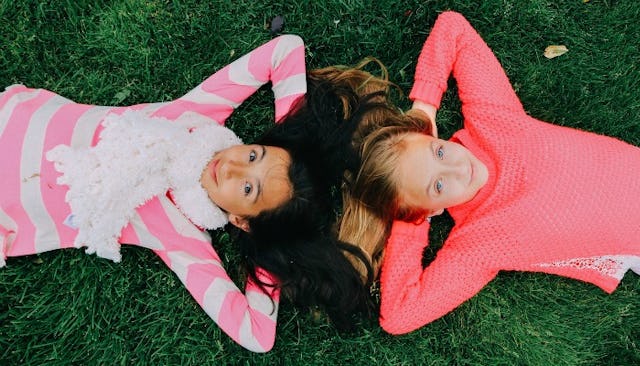6 Truths About Parenting Older Kids (That No One Ever Tells You)

After a decade of parenting, I thought I had it figured out. I’d set boundaries that kept my three girls safe and emotionally secure, established reasonable but firm expectations, pushed them when they needed it, and threw in a little flexibility to keep things fun. Then the oldest one turned 10, and without warning, my parenting expertise went out the window. My daughter pushed back against every one of my once sacred rules, stopped seeking my counsel, and began rejecting my opinions in favor of her own.
Ouch.
Transitioning from parenting young children to parenting older kids was a challenge for me, even though it makes sense that as my children grow and shift, so too should my approach to parenting. On the one hand, it’s difficult to make room for their individual perspectives and ways of doing things, especially when they don’t jive with my own. On the other, it’s wondrous to witness my children attempt new skills, dive into new experiences, and make their own decisions as part of the process of becoming their whole selves.
Now that my oldest girl is 14, I’m slightly more comfortable in my still burgeoning role as Consultant rather than Manager. Here’s what I’ve learned so far about parenting older kids:
1. Letting go of their childhood is harder than you think.
The early years of parenting are a mishmash of joy, tears, contentment, confusion and physical toil. You can’t imagine your baby will ever be able to do anything herself. Then one day, she’s tying her own shoes, going on her first sleepover and texting her friends to make plans. You won’t miss the poopy diapers or crack-of-dawn wake ups. You’ll miss the way she said “flingo” instead of “flamingo” and what it felt like watching her ride a two-wheeler for the first time. Seeing my children morph from little kid to big kid and beyond is a thrill, but saying goodbye to their childhood years is bittersweet.
2. You will have only a vague idea of what they look like naked.
My little girls used to run around the house buck-naked and giggling, stopping only to shake their booties, grab a banana or jump in the tub. Those days are over. Now my tween changes behind firmly closed doors and freaks out if she even remotely senses me nearby while she’s in her skivvies. It’s not that I want to scrutinize her naked bod; it’s that I miss the closeness we once shared when nothing came between my baby and me.
3. They test your limits in ways they never did as toddlers.
Little kids throw tantrums, say “no!” a lot, and refuse to eat their broccoli, but you can usually soothe and steer them toward your way of doing things. Older kids, who stick to their own convictions, are a lot more challenging. Now my girls refuse to take my sartorial advice because “everyone wears ripped shorts.” They argue their way out of cleaning their rooms with the excuse of having too much homework. They say things like, “I don’t really want to” and “In a minute.” Their dissent is, frankly, infuriating. As a parent on the receiving end of my girls’ budding autonomy, I try to curb my frustration with a lot of deep breaths, but it doesn’t always work.
4. They stop asking so many questions.
Little kids ask a gazillion questions like, “Why is snow cold?” and “Why was I born last?” Around 10 years old, the questions from my girls slowed down a bit, and they often knew how to find the answers themselves. One day the questions sort of…stop. This happened around the time my oldest daughter turned 13 and I actually wanted her to ask me about stuff, like puberty, peer pressure, dating and drugs. Without any substantial questions to answer, I simply launch into lecture mode, causing her to roll her eyes and wonder why her mom is such a dork. Hopefully she’s still getting the message.
5. They will shake your parenting confidence.
Maybe the reason they stop asking us so many questions is because older kids are on to us. After years of viewing us as the all-knowing wizard who sets the rules, feeds, clothes, comforts and protects them, they begin to see us for what we truly are: human. As my girls grow and individuate, I don’t always know how to parent in the new environment. This caught us all off guard at first, but now I’m honest when I’m unsure or need more information or time to think. Recognizing that I don’t have all the answers all of the time isn’t exactly comforting, but it gives me the chance to readjust my parenting and be okay with being human.
6. They will amaze you with who they are becoming.
A few weeks ago I peeked in on my older daughter’s band practice. She’s the lead singer, so when she took a seat at the drums, I did a double take — I had no idea she was learning to play the drums. She tapped out a four count and the band took off into a freestyle jam. She played with focused confidence and total joy. I was in awe. Younger kids amaze us by reaching developmental milestones and applying concepts. Older kids branch out on their own in ways we don’t dictate and in places we’re not always privy to. It’s another form of separating, but seeing my girl determine and pursue what thrills her was such a gift.
As my kids transition from childhood to young adulthood, they’re forcing me to look at my role as a parent in a whole new way. Giving them more leeway while still providing boundaries definitely takes some getting used, but it also helps me take a step back and see my girls for the glorious human beings they’re becoming.
This article was originally published on